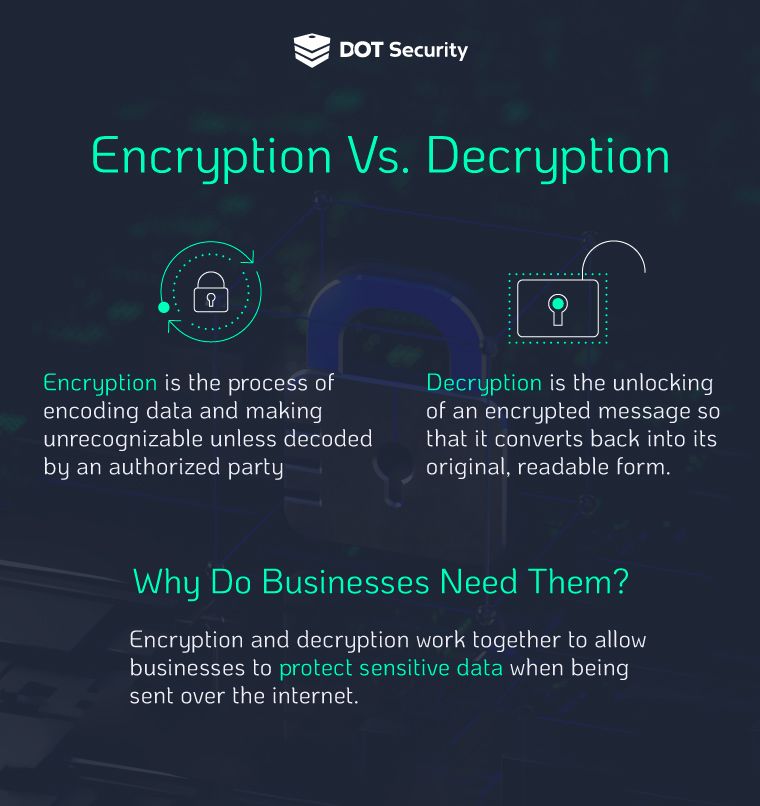Secure Data Protection
What is Data Encryption?
April 18, 2022
6 minutes

It’s become more important than ever to ensure the safety of the data collected by businesses, whether it’s information from customers, clients, partners, vendors, or internal teams, hackers want it so businesses need to be ready.
One way businesses are doing this is through encryption of data. Read on to learn more about how it works and what you can do to implement it in your business effectively.
Sign up for our newsletter!

Encryption Vs. Decryption
In order to protect data, businesses must take steps to keep it from falling into the wrong hands if it does get stolen while being stored or transferred. The most common way to do this is through data encryption and decryption which helps ensure the contents of messages and files are unable to be abused by bad actors.
Here’s a look at both ends of the process and how they fit together into data protection solutions.
Encryption
Encryptionis the process of “scrambling” data to make it unreadable and only able to be read again by a person who has a code or decryption key. Without that key, the message is in “ciphertext” which renders it unusable.
One of the most common types of encryptions is called “secure sockets layer” which is used by websites to encrypt data that’s sent to and from them. This is often seen as a sign that a website is “legitimate” and not a scam site trying to pass itself off as the real thing. When browsing, be sure to check that the site’s address starts with HTTPS to know if it’s secure.
Related: What are the Components of Information Security?
Encryption is used on data that might be exposed to potential threats such as when sensitive business or personal information is stored or transferred between people, businesses, or networks.
Decryption
Decryption is the other end of encrypted data. It’s the process of using a decryption key to unlock data and make it readable again.
Why Do Businesses Need Encryption?
Beyond just wanting to protect data from being misused, there are multiple reasons that businesses should use encryption in day-to-day communication and data management.
These reasons include protecting credentials, increasing trust from users, ensuring nobody is tampering with files, and ensuring safe communication throughout an organization.
Additionally, encryption has become important in many more critical ways, including:
Defending Business Data Against Hackers
The number of cyberattacks on businesses of all sizes is growing each year and was accelerated by the sudden surge in digitization brought on by the pandemic.
To protect business data, businesses need to use encryption to keep data from being stolen, used as blackmail, taken for ransom, or sold to third parties.
Protecting the Privacy of Your Users
No matter if it’s company emails, customer service communication, patient records, contract information, or any other kind of data, it’s important to protect the privacy of everyone by using encryption methods when transferring or communicating across networks.
Maintaining Compliance with Regulations
Many regulations like HIPAA require businesses to implement security tools like encryption in order to be compliant. For businesses in finance, education, or healthcare, the odds are that you’ll need to use encryption to avoid fines or other punishments that come from falling short of compliance standards.
How is Encryption Used in Business Cybersecurity?
- Securing Stored Data: Whether it’s stored in on-site servers, hard drives on computers or laptops, or on smartphones, stored business data should be encrypted to remove the risk of sensitive information being stolen and misused. This protects against cyberattacks, but also against more innocent mishaps like losing a laptop with company information.
- Securing Individual Files: Depending on the information, businesses can encrypt every necessary individual file to protect highly confidential information.
- Protecting Data on the Move: Data on the move is sometimes ripe for the picking for hackers, especially when moving across company lines or over insecure Wi-Fi networks. Encryption gives businesses an additional layer of security when data is exposed.
In Conclusion
Data is valuable, and hackers know it. That’s why it’s so important to always protect it with proper encryption. Without encryption, you risk having your data stolen which can result in ransoms, misuse, extortion, data leaks, and compliance issues.
Learn more about the best ways to protect your business’ and customer’s data with secure data solutions from a team of experts at DOT Security.
You can explore more helpful resources on our Insights Page or see exactly how covered your business is against cyberattacks with our latest eBook, How Covered is Your Business, which can be downloaded HERE.
